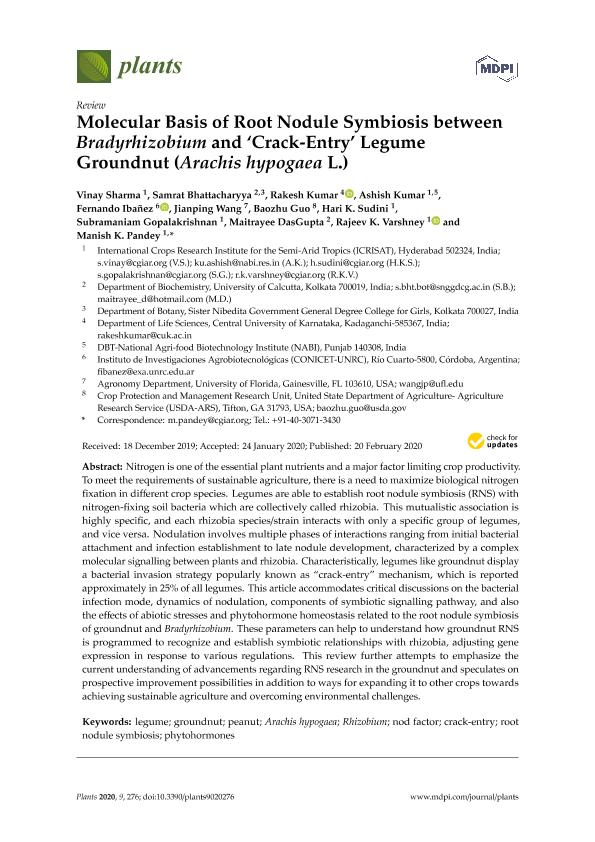Artículo
Molecular basis of root nodule symbiosis between bradyrhizobium and ‘crack-entry’ legume groundnut (Arachis hypogaea l.)
Sharma, Vinay; Bhattacharyya, Samrat; Kumar, Rakesh; Kumar, Ashish; Ibañez, Fernando Julio ; Wang, Jianping; Guo, Baozhu; Sudini, Hari K.; Gopalakrishnan, Subramaniam; Dasgupta, Maitrayee; Varshney, Rajeev K.; Pandey, Manish K.
; Wang, Jianping; Guo, Baozhu; Sudini, Hari K.; Gopalakrishnan, Subramaniam; Dasgupta, Maitrayee; Varshney, Rajeev K.; Pandey, Manish K.
 ; Wang, Jianping; Guo, Baozhu; Sudini, Hari K.; Gopalakrishnan, Subramaniam; Dasgupta, Maitrayee; Varshney, Rajeev K.; Pandey, Manish K.
; Wang, Jianping; Guo, Baozhu; Sudini, Hari K.; Gopalakrishnan, Subramaniam; Dasgupta, Maitrayee; Varshney, Rajeev K.; Pandey, Manish K.
Fecha de publicación:
02/2020
Editorial:
MDPI
Revista:
Plants
e-ISSN:
2223-7747
Idioma:
Inglés
Tipo de recurso:
Artículo publicado
Clasificación temática:
Resumen
Nitrogen is one of the essential plant nutrients and a major factor limiting crop productivity. To meet the requirements of sustainable agriculture, there is a need to maximize biological nitrogen fixation in different crop species. Legumes are able to establish root nodule symbiosis (RNS) with nitrogen-fixing soil bacteria which are collectively called rhizobia. This mutualistic association is highly specific, and each rhizobia species/strain interacts with only a specific group of legumes, and vice versa. Nodulation involves multiple phases of interactions ranging from initial bacterial attachment and infection establishment to late nodule development, characterized by a complex molecular signalling between plants and rhizobia. Characteristically, legumes like groundnut display a bacterial invasion strategy popularly known as “crack-entry’’ mechanism, which is reported approximately in 25% of all legumes. This article accommodates critical discussions on the bacterial infection mode, dynamics of nodulation, components of symbiotic signalling pathway, and also the effects of abiotic stresses and phytohormone homeostasis related to the root nodule symbiosis of groundnut and Bradyrhizobium. These parameters can help to understand how groundnut RNS is programmed to recognize and establish symbiotic relationships with rhizobia, adjusting gene expression in response to various regulations. This review further attempts to emphasize the current understanding of advancements regarding RNS research in the groundnut and speculates on prospective improvement possibilities in addition to ways for expanding it to other crops towards achieving sustainable agriculture and overcoming environmental challenges.
Archivos asociados
Licencia
Identificadores
Colecciones
Articulos (INIAB)
Articulos de INSTITUTO DE INVESTIGACIONES AGROBIOTECNOLOGICAS
Articulos de INSTITUTO DE INVESTIGACIONES AGROBIOTECNOLOGICAS
Citación
Sharma, Vinay; Bhattacharyya, Samrat; Kumar, Rakesh; Kumar, Ashish; Ibañez, Fernando Julio; et al.; Molecular basis of root nodule symbiosis between bradyrhizobium and ‘crack-entry’ legume groundnut (Arachis hypogaea l.); MDPI; Plants; 9; 2; 2-2020; 1-24
Compartir
Altmétricas



